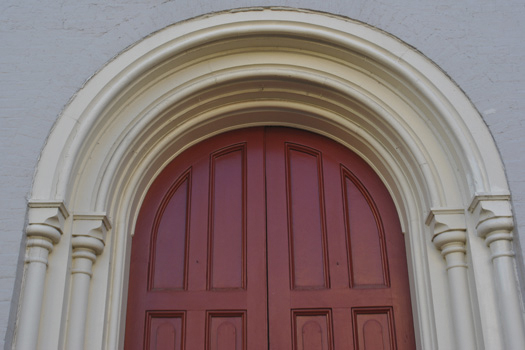Ficklen’s father was an owner of Belmont and an original pew holder in 1849. He built the original Bridgewater Mills in 1822. Two sons, Joseph B. Ficklen, Jr. and William Ficklen became partners in the mills.
The mill sat on the lower raceway, just south of the Falmouth Bridge in Fredericksburg. It had the capacity of producing about 160 barrels of flour and 400 bushels of meal per day in the late 19th century. While the mill originally employed burr stones, a roller system was installed in the 1880s. In 1884, about 110 horsepower of water power was required to run the mill.
By the late 19th century the milling complex consisted of a connected string of buildings including a flour mill, corn mill, warehouse, and grain elevator. Adjoining were cooper shops, stables, millers’ houses and an office.
The mill produced ten grades of flour, “Ficklen’s Superlative” being the best. It also ground corn meals and animal feeds. This mill gained international recognition when it won a diploma and silver medal for its display at the Paris Exposition of 1878. Bridgewater Mills also produced the first flour branded “family” in the United States.
He was also telephone pioneer was involved in the setting up of the first telephone line in the area in July, 1878, just two years after the invention of the phone. It was a private line from Bridgewater Mills in Falmouth to the office of J. B. Ficklen & Sons
He became president of Rappahannock Electric Light. Rappahannock Electric provided electricity for city street lights as well as power for homes, businesses, industry, and public buildings. On November 3, 1887, Fredericksburg was lighted for the first time with electricity
Ficklen main service to St. George’s came through the Vestry. He came on the Vestry April 1875 in place of William Fitzhugh. It was a time of financial problems. In 1876, they had to borrow from the Female Charity School for $1,300 and he served on a committee to organize the loan. The church needed repainting in the late 1870’s and Ficklen also donated $500 re-paint the church. He also donated ventillators for the windows to cool the Lecture room.
It was a time of a split in the church with a portion of the congregation forming Trinity with a portion of the congregation following the previous rector. There was some social issues – at one point Rev. McBryde put forward a resolution inviting “all classes and colors of our citizens to join with us in public worship.” Apparently there was criticism of bring the “lower classes into the church as members.”
In the Vestry meeting on December, 4, 1878, a committee was appointed to consider repairs of the Sunday School room and ascertain the cost of furnishing it. The Church was undergoing improvements, including painting of the exterior and repairs to the Sunday School room. Mr. A. K. Phillips was to be the chairman of the committee. He reported at the next meeting on Jan 29, 1879 that he had “parties in Baltimore who had agreed to furnish settees at 45 cents a foot and those with reversable [sic] backs would cost one dollar extra. It was moved 50 settees be purchased. 25 would have reversable [sic] backs. We still have 20 of them today. It is not clear how they were financed though a portion of the repairs were made by Maj. F. T. Doswell.
The Vestry had continual financing problem along with a rector that was ailing physically in 1881. In June, 1881, the wardens were requested to address a letter over delinquent pew taxes. Pews were sold subject to this tax and that the pews could revert back to the church if not paid.
Ficklen resigned from the Vestry in 1882.
